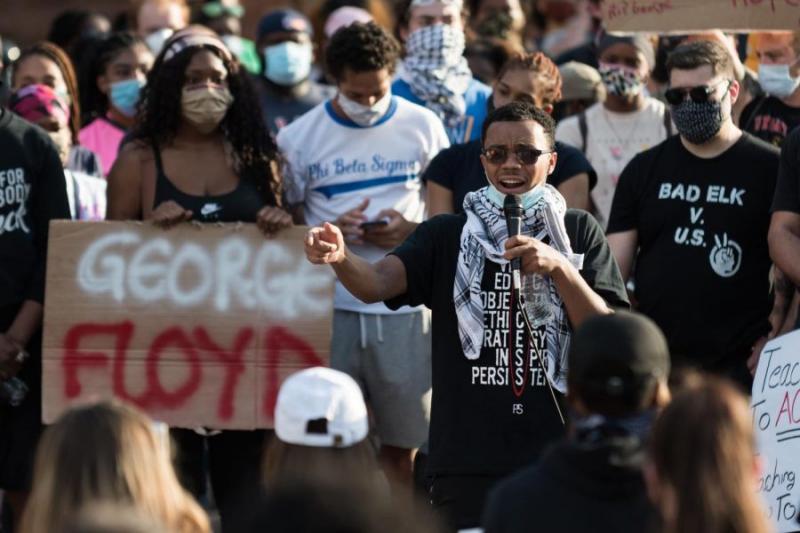
Nutrition has many meanings for MPH student Drake Materre
Master of Public Health student Drake Materre is a man of many interests: education, politics, music, organizing, religion. But the one probably closest to his heart is nutrition.
Except when Materre thinks about nutrition, it means more than food. Materre’s mother, Lauren, created Natural Path Nutrition Inc. (NPN) in 2012 in Chicago with a mission to provide nutrition education to young, inner-city children and senior citizens. NPN has conducted nutrition education programs at elementary schools and assisted living centers while offering healthy food options.
“At first I would say, ‘We teach nutrition education. But as I got older, it's difficult for me to just say, ‘Oh yeah, you need to eat these healthy foods,’” Materre said. “A lot of people may not have the time to cook and prepare the food or have access to food. I do teach nutrition education, but I always do it with a political edge, where I empower people to fight for better health.”
Materre credits his mother for his introduction to (and interest in) nutrition. He accompanied her to information sessions with senior citizens and children and before long, he created some nutrition education programs of his own. He also works with a food distribution center in Urbana in collaboration with an organization called Silver Hearts, which aids the underserved Silverwood neighborhood. Additionally, Materre is involved with pop-up pantries in Champaign and Urbana.
But food is only one element of Materre’s education platform.
“While taking community health courses, I started to understand that health can really be an area of focus that is necessary when it comes to talking about Black liberation,” he said, explaining that people of color, particularly black school-aged children, lack access to fresh fruits and vegetables.
“I like to educate people on why they may not have that access, why they may not have that capability. Giving them that political and social insight, in terms of, why members of the community may not be able to eat these type of foods.”
Materre explains that the lack of access to healthy food options lies not only in the food deserts of some areas of Champaign-Urbana, but in the infrastructure of the cities. According to the Centers for Disease Control and Prevention (CDC), food deserts are “areas that lack access to affordable fruits, vegetables, whole grains, low-fat milk, and other foods that make up the full range of a healthy diet.”
“Being from Chicago, but really becoming a part of the (Champaign) community, there's definitely some lack of infrastructure. Not even just in terms of food deserts, but in terms of sidewalks, and how that can be detrimental to the health of children.
“The north end of Champaign is like the Douglass Park area and Garden Hills,” he said. “These are communities that are experiencing lack of access to food. However, there is a great access to liquor stores and smoke shops. Unfortunately, Champaign has a lot of liquor stores. There are liquor stores next door to liquor stores.”
Materre said the lack of access to healthy food is exacerbated by a perceived lack of access, and that people in the community north of the university don’t feel comfortable shopping on campus.
“There is a big divide between the University and Champaign-Urbana, the city itself and the communities that are here. ‘Can I even go to Green Street and utilize a Target? Can I go to County Market and utilize County Market for my needs?’ We understand that there are people in the community that may not feel comfortable going on campus.”
Materre also works with children at Booker T. Washington, an elementary school in Champaign, to discuss identity and education.
“I'm there to help the young Black students, in terms of social emotional learning, how to deal with trauma, how to build their agency in responding to certain instances, and I believe again, that's also part of health. Students may feel as if they don't have the power. I tell them, if you want healthier foods, ‘If you want better foods at your lunch, you can make some noise and let that happen.’ My approach is try to organize people to increase their health, to better their health. And so nutrition is definitely a part of that. I can't just say organize around stuff with no cause. You've got to be a rebel with a cause.”
For Materre, there is no easy answer to solving the problem of food insecurity, but he says the burden is not on parents, or even schools, to provide resources.
“I think the burden is on the system and structure itself that place people in these conditions that lead to negative health,” he said. “I will say, the burden is on the structure. But I believe that us as a community, we're able to take on that accountability that responsibility and organize around our children.”
As for what comes next for him, this man of many interests has, as you might expect, many options.
“I'm a Muslim and I'm a spiritual man,” he said. “And wherever life takes me, I'm going be involved within the community in some way, shape, or form. I would love to go and get a doctorate, just so people can call me Dr. Materre, you know, that'd be cool. But really teaching, I'd just love to be a teacher. So wherever I go, if that's a doctorate, that's not a doctorate, I must be involved with the community and for the people.
“You know, as (late Congressman and civil rights activist) John Lewis would say, ‘Some good trouble.’ Some good trouble in order to get where we need to get to, right?”
